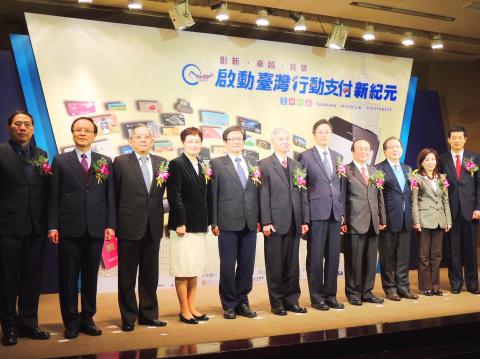Taiwan Mobile Payment Co (台灣行動支付公司), a new mobile payment platform, aims to attract NT$10 billion (US$314.8 million) in transactions via smart cards and smartphones over the next three years on the back of surging local e-commerce, a company executive said yesterday.
The service’s launch came one day after the legislature passed the preliminary reading of a draft bill governing third-party mobile payments.
The draft’s final approval by legislators is expected to boost domestic mobile transactions via ATM cards, credit cards and smartphones.

Photo: Lee Ching-hui, Taipei Times
Taiwan Mobile Payment, a joint venture of Financial Information Service Co (財金資訊公司), the National Credit Card Center (聯合信用卡處理中心) and the Clearing System Development Foundation (台灣票據交換所), launched its payment service provider trusted service manager platform for processing mobile payments.
Chairperson Chao Yang-ching (趙揚清) said the target was “reachable,” given Taiwan’s NT$70 billion e-commerce market.
CHUNGHWA TELECOM
Taiwan Mobile Payment is to work with Chunghwa Telecom Co (中華電信) to offer 100,000 USIM cards that support near-field-communication (NFC) technology.
The technology allows users to tap their smartphones or tablets on a card reader at selected retailers.
To facilitate development of the platform, Taiwan Mobile Payment — primarily backed by 32 local banks — plans to install 20,000 NFC card readers next year at more than 30,000 stores, including Pacific Sogo Department Stores Co (太平洋崇光百貨) and Kingstone Bookstores (金石堂).
Subscribers to the service via Chunghwa Telecom can also make payments overseas, in stores certified by Visa Inc and MasterCard Inc, Taiwan Mobile Payment said.
GROWTH CURVE
Domestic mobile payment transactions are expected to surge by 42 percent next year to NT$89 billion, market researcher International Data Corp (IDC) forecast.
Person-to-person and mobile online commerce are expected to make up the bulk of the growth — about 98 percent — IDC said.
Transactions via smart cards or devices using NFC technology and QR codes are expected to grow to NT$13.8 billion over the next three years, IDC said.
Taiwan Mobile Payment faces off against TSM, a mobile payment platform unveiled by Alliance Digital Tech Co (群信行動) on Monday last week. Alliance Digital is a joint venture from Taiwan’s major telecoms, smart-card issuer EasyCard Corp (悠遊卡公司) and several local banks.
Alliance Digital plans to commercialize its payment platform in the second quarter of next year, it said.
The company is expected to issue 300,000 NFC SIM cards in the first stage, with the number likely expanding to 500,000 cards by the end of next year, it added.
DIGITAL PAYMENTS
According to the latest data released by the Financial Supervisory Commission, digital payments in the nation totaled NT$4.7 billion last month, compared with NT$4.8 billion recorded a month earlier.
A total of 57,260 digital payment cards have been issued, with four domestic specialized companies and four banks operating in the sector, the commission said yesterday in a statement.
Additional reporting by Amy Su

AI BOOST: Although Taiwan’s reliance on Chinese rare earth elements is limited, it could face indirect impacts from supply issues and price volatility, an economist said DBS Bank Ltd (星展銀行) has sharply raised its forecast for Taiwan’s economic growth this year to 5.6 percent, citing stronger-than-expected exports and investment linked to artificial intelligence (AI), as it said that the current momentum could peak soon. The acceleration of the global AI race has fueled a surge in Taiwan’s AI-related capital spending and exports of information and communications technology (ICT) products, which have been key drivers of growth this year. “We have revised our GDP forecast for Taiwan upward to 5.6 percent from 4 percent, an upgrade that mainly reflects stronger-than-expected AI-related exports and investment in the third

Mercuries Life Insurance Co (三商美邦人壽) shares surged to a seven-month high this week after local media reported that E.Sun Financial Holding Co (玉山金控) had outbid CTBC Financial Holding Co (中信金控) in the financially strained insurer’s ongoing sale process. Shares of the mid-sized life insurer climbed 5.8 percent this week to NT$6.72, extending a nearly 18 percent rally over the past month, as investors bet on the likelihood of an impending takeover. The final round of bidding closed on Thursday, marking a critical step in the 32-year-old insurer’s search for a buyer after years of struggling to meet capital adequacy requirements. Local media reports

TECHNOLOGICAL RIVALRY: The artificial intelligence chip competition among multiple players would likely intensify over the next two years, a Quanta official said Quanta Computer Inc (廣達), which makes servers and laptops on a contract basis, yesterday said its shipments of artificial intelligence (AI) servers powered by Nvidia Corp’s GB300 chips have increased steadily since last month, should surpass those of the GB200 models this quarter. The production of GB300 servers has gone much more smoothly than that of the GB200, with shipments projected to increase sharply next month, Quanta executive vice president Mike Yang (楊麒令) said on the sidelines of a technology forum in Taipei. While orders for GB200 servers gradually decrease, the production transition between the two server models has been

ASE Technology Holding Co (日月光投控), the world’s largest integrated circuit (IC) packaging and testing supplier, yesterday announced a strategic collaboration with Analog Devices Inc (ADI), coupled with the signing of a binding memorandum of understanding. Under the agreement, ASE intends to purchase 100 percent shares of Analog Devices Sdn Bhd and acquire its manufacturing facility in Penang, Malaysia, a press release showed. The ADI Penang facility is located in the prime industrial hub of Bayan Lepas, with an area of over 680,000 square feet, it said. In addition, the two sides intend to enter into a long-term supply agreement for ASE to